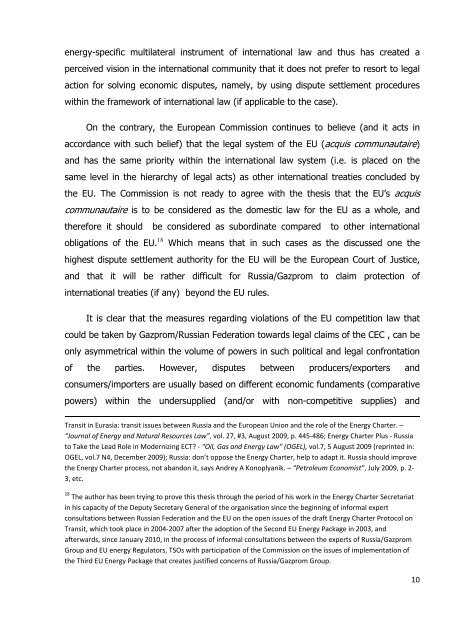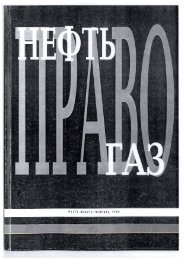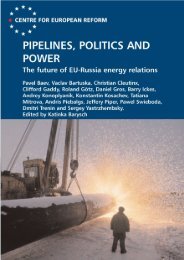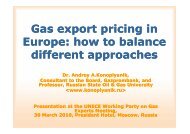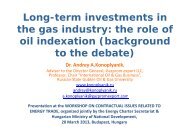state agency for Gazprom within the framework as outlined in Presidential Decree No.1285.1.4 Asymmetrical measuresThe actions of the СEC and response of Gazprom and the Russian President haveactually pushed the debate further into political, partly legal, and obviously into “powerstruggle” field, thus transferring the conflict from a “force of arguments” into a“arguments of force” debate.It is clear that Gazprom and the Government of the Russian Federation are boundto debate within the framework of the EU legislation, applicable within the borders ofthe EU, regardless of whether Gazprom and/or the Russian authorities like the situation.It is also clear that the most effective protective measures in such cases would havebeen the provisions of international law, should the parties agree that correspondingactions of the Commission violate any provisions included in various instruments ofinternational law.But it seems that both parties might not choose this avenue, though for differentreasons. The withdrawal in October 2009 from the provisional application of the <strong>Energy</strong>Charter Treaty and the statement that Russia had no intention to ratify the ECT 16 (fromthis author’s view – with no single well-justified and/or demonstratively provedreason 17 ), it had shown that it does not welcome this most advanced and effective16 Распоряжение Правительства Российской Федерации от 30 июля 2009 г. №1055‐р (Russian GovernmentOrdinance as of 30 July 2009 N1055‐r); The <strong>Energy</strong> Charter Secretariat. Message № 826/09: A Communicationfrom the Depository of the ECT and PEEREA. Brussels, 25 August 2009.17 See author’s publications such as, for instance: Россия и Энергетическая хартия: долгий и извилистый путьнавстречу друг другу. – «ЭКО: Всероссийский экономический журнал», декабрь 2010, № 12 (438), с. 114‐132(часть 1); Энергетическая хартия: отменить нельзя модернизировать. ‐ «ЭКО: Всероссийский экономическийжурнал», февраль 2011, № 2 (440), с. 118‐136 (часть 2); Why Is Russia Opting Out of the <strong>Energy</strong> Charter? –«International Affairs», 2010, vol. 56, № 2, p. 84 ‐96; Выход России из временного применения ДЭХ и «делоЮКОСа»: комментарий по итогам процедурного решения арбитражного суда в Гааге. – «Нефть, газ иправо», 2010, № 1, с. 42‐49; Выход России из временного применения ДЭХ: мифические угрозы оказалисьсильнее реальных выгод? – «Нефть и газ», ноябрь 2009, № 9, с. 32‐35 (Украина); Russia remains a signatoryof the <strong>Energy</strong> Charter Treaty. – “Financial Times” (Comments/Letters to the Editor), 26 August 2008, p. 6; <strong>Gas</strong>9
energy-specific multilateral instrument of international law and thus has created aperceived vision in the international community that it does not prefer to resort to legalaction for solving economic disputes, namely, by using dispute settlement procedureswithin the framework of international law (if applicable to the case).On the contrary, the European Commission continues to believe (and it acts inaccordance with such belief) that the legal system of the EU (acquis communautaire)and has the same priority within the international law system (i.e. is placed on thesame level in the hierarchy of legal acts) as other international treaties concluded bythe EU. The Commission is not ready to agree with the thesis that the EU’s acquiscommunautaire is to be considered as the domestic law for the EU as a whole, andtherefore it should be considered as subordinate compared to other internationalobligations of the EU. 18 Which means that in such cases as the discussed one thehighest dispute settlement authority for the EU will be the European Court of Justice,and that it will be rather difficult for Russia/Gazprom to claim protection ofinternational treaties (if any) beyond the EU rules.It is clear that the measures regarding violations of the EU competition law thatcould be taken by Gazprom/Russian Federation towards legal claims of the СEC , can beonly asymmetrical within the volume of powers in such political and legal confrontationof the parties. However, disputes between producers/exporters andconsumers/importers are usually based on different economic fundaments (comparativepowers) within the undersupplied (and/or with non-competitive supplies) andTransit in Eurasia: transit issues between Russia and the European Union and the role of the <strong>Energy</strong> Charter. –“Journal of <strong>Energy</strong> and Natural Resources <strong>Law</strong>”, vol. 27, #3, August 2009, p. 445‐486; <strong>Energy</strong> Charter Plus ‐ Russiato Take the Lead Role in Modernizing ECT? ‐ “<strong>Oil</strong>, <strong>Gas</strong> and <strong>Energy</strong> <strong>Law</strong>” (OGEL), vol.7, 5 August 2009 (reprinted in:OGEL, vol.7 N4, December 2009); Russia: don’t oppose the <strong>Energy</strong> Charter, help to adapt it. Russia should improvethe <strong>Energy</strong> Charter process, not abandon it, says Andrey A Konoplyanik. – “Petroleum Economist”, July 2009, p. 2‐3, etc.18 The author has been trying to prove this thesis through the period of his work in the <strong>Energy</strong> Charter Secretariatin his capacity of the Deputy Secretary General of the organisation since the beginning of informal expertconsultations between Russian Federation and the EU on the open issues of the draft <strong>Energy</strong> Charter Protocol onTransit, which took place in 2004‐2007 after the adoption of the Second EU <strong>Energy</strong> Package in 2003, andafterwards, since January 2010, in the process of informal consultations between the experts of Russia/GazpromGroup and EU energy Regulators, TSOs with participation of the Commission on the issues of implementation ofthe Third EU <strong>Energy</strong> Package that creates justified concerns of Russia/Gazprom Group.10
- Page 1 and 2: Oil, Gas & Energy Law Intelligencew
- Page 4 and 5: The CEC declared that the matter wi
- Page 6 and 7: publicly significant functions and
- Page 8 and 9: 1.3 Decree 1825On September 11 th 2
- Page 12 and 13: oversupplied (with competitive supp
- Page 14 and 15: From my point of view, there are ma
- Page 16 and 17: ecause of the enlargement of the EU
- Page 18 and 19: Gazprom" times by the Soviet state-
- Page 20 and 21: 3 Claim 1. But could Gazprom separa
- Page 22 and 23: 3.1 Destination clausesAnother logi
- Page 24 and 25: eselling of gas destined for the mo
- Page 26 and 27: From my view, most of the blame tow
- Page 28 and 29: This way, the main goal for the EC'
- Page 30 and 31: development of, for example, the "N
- Page 32 and 33: investment climate for infrastructu
- Page 34 and 35: producer at early stages of market
- Page 36 and 37: Figure 4. Evolution of oil & gas ma
- Page 38 and 39: Producers/exporters/hedgers (Indust
- Page 40 and 41: Moreover, evaluating the entire Eur
- Page 42 and 43: manipulations of the gas price by g
- Page 44 and 45: state might expect by this short-te
- Page 46 and 47: So it is very important to bear in
- Page 48 and 49: In my view, such a soft adaptation
- Page 50 and 51: competitive supplies in this area,
- Page 52 and 53: arbitrary panel outcomes; settlemen
- Page 54 and 55: need to develop more costly fields
- Page 56 and 57: (Figure 11. LTGEC in Europe: indexa
- Page 58 and 59: the Russian gas and large taxpayers
- Page 60 and 61:
many Europeans, but, and this is mo
- Page 62:
RIA “Novosti” - Russian Informa


